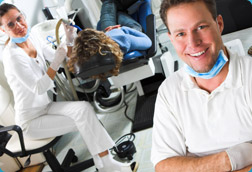Dental Therapist
A dental therapist is one of the least common roles and you do not find them in every practice. However, in a particularly large or busy practice, a dental therapist can provide valuable support to the dentists. Because the dental therapists can perform basic dental treatments, they can free up the dentists’ time to focus on more complex procedures and patients with more serious dental issues.
What does the job involve?
As a Dental Therapist, you will carry out all of the duties of a Dental Hygienist plus a number of more complicated procedures. In some cases, you will work under the supervision of a dentist as you help out with more complex treatments.
Normally, the dentist will refer a patient to the Dental Therapist if he or she requires it. The Dental Therapist will evaluate the patients overall oral health and, if necessary, scale, polish and seal the teeth to stop them from decaying in the future. On occasions, the Dental Therapist may go on to perform treatments such as fitting temporary crowns and fillings, and restoring or extracting milk teeth.
In many cases, the dentist will refer individuals to the Dental Therapist if the treatment is routine but is complicated by other factors. For example, the Dental Therapist may be better able to treat children or dental phobics who are highly anxious about their treatment. They may also treat people with learning difficulties or who are disabled. This is because they are often able to spend more time with patients than the dentist can, who has the challenge of fitting the more routine work around the more complex procedures.
By spending more time with patients, the Dental Therapist can help them relax and help to ensure that their teeth are kept in good condition. In the future, this may mean that patients who are more vulnerable to decay can avoid it – and therefore avoid more complex and expensive dental work.
What qualifications do you need?
As Dental Therapist is a relatively rare occupation, many dental schools offer a combined Dental Hygiene and Dental Therapy course. This means that you can become qualified as both a Dental Hygienist and a Dental Therapist, increasing the number of job opportunities available to you in the future.
You must complete a relevant course so that you can register with the General Dental Council. At the same time, however, as a Dental Therapist you also need really good people skills. You need to be able to put people at their ease, explain procedures clearly and empathise with how patients are feeling.
What are the career prospects?
Most Dental Therapists enjoy the opportunity to become a valued member of a practice and build their own reputation amongst patients. Many Dental Therapists can build strong, long-term relationships that ensure patients stay with them for many years.
Featured Jobs
-
Example Job
- Salary:
- £24,000
- Location:
- Preston, Lancashire
Lorem ipsum dolor sit amet, consectetuer adipiscing elit. Nam nisl ipsum, interdum id, fermentum ut, convallis sed, tellus.
More Info -
Example Job
- Salary:
- £24,000
- Location:
- Preston, Lancashire
Lorem ipsum dolor sit amet, consectetuer adipiscing elit. Nam nisl ipsum, interdum id, fermentum ut, convallis sed, tellus.
More Info -
Example Job
- Salary:
- £24,000
- Location:
- Preston, Lancashire
Lorem ipsum dolor sit amet, consectetuer adipiscing elit. Nam nisl ipsum, interdum id, fermentum ut, convallis sed, tellus.
More Info
